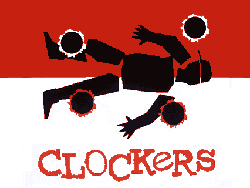"Everybody wants to play with a bigger train set"
Independent filmmaker Bret Stern's response to Leonard Lopate
asking whether he'd be tempted by a Hollywood offer.
(NPR: WNYC New York and Company, September 5, 2002)
Few people with financial resources imagine that they share a common interest with those men on the street - an attitude exemplified by that coterie of rich white men who are lining their pockets while driving the United States hard towards a war of aggression and fraud-led recession. Which is to say, the ghetto is still with us and it's not easy to escape. But what has that got to do with film?
One of the functions of film is to make us take another look at the world around us through someone else's eyes. Through fictional narrative or nonfictional documentary, film can take those men by the station and make us notice some of the reasons why they have to stand there. The difficult task is to make it interesting enough to encourage people to watch it but not at the price of glorifying a terrible situation. The filmmaker has to be aware of the danger of voyeurism: of enjoying (or helping people enjoy) watching the situation exactly because it IS so terrible. Sometimes as a result of cynicism and sometimes because of incompetence, films which seem to preach about a certain evil (e.g. the use of violence) may in fact encourage it.
The charges of voyeurism and exploitation were levelled at Spike Lee when his 1995 film Clockers came out. But a closer look at Clockers reveals that Lee is quite aware of the perils of those who are forced to live by the rules of the ghetto, or of being co-opted by the forces that perpetuate those rules.
 The opening credits of the film roll over a series of pictures of
gunshot wounds in young African American men as they lie dead,
covered in their own blood. Given the context of the film we presume
they were shot in drug-related shootings, but we see the bodies before
we are given that context, which means that we see them as victims rather than
as co-conspirators.
The opening credits of the film roll over a series of pictures of
gunshot wounds in young African American men as they lie dead,
covered in their own blood. Given the context of the film we presume
they were shot in drug-related shootings, but we see the bodies before
we are given that context, which means that we see them as victims rather than
as co-conspirators.
Lee was accused of sensationalism in the sequence, but Lee uses the slow, continuous movement of the camera as it documents the bodies to evoke the visceral reality that stands behind the impersonal statistics of the annual number of drug-related homicides in the U.S. As in a trial, the initial statement of the crime gives the evidence that follows extra importance. By showing these bodies before we have any context within which to judge their deaths, Lee grounds the action that follows in the real violence it creates.
|
|



film politics music jay's head poetry art josh ring saddies about archive